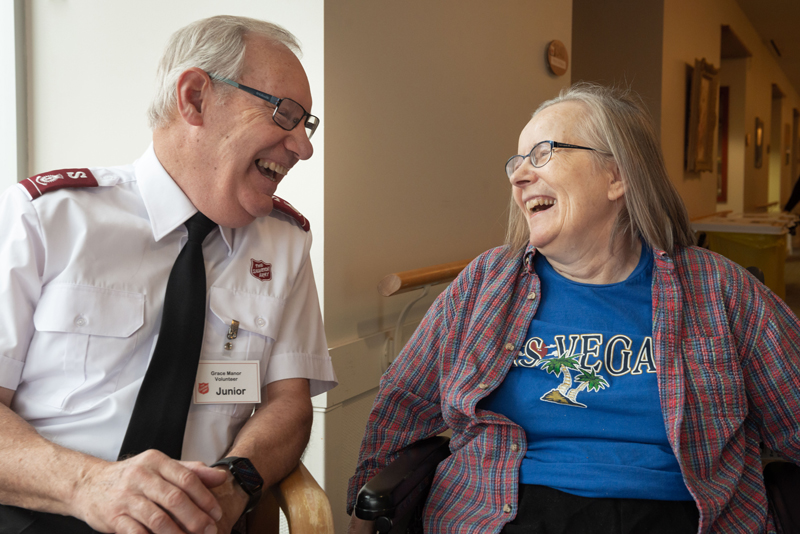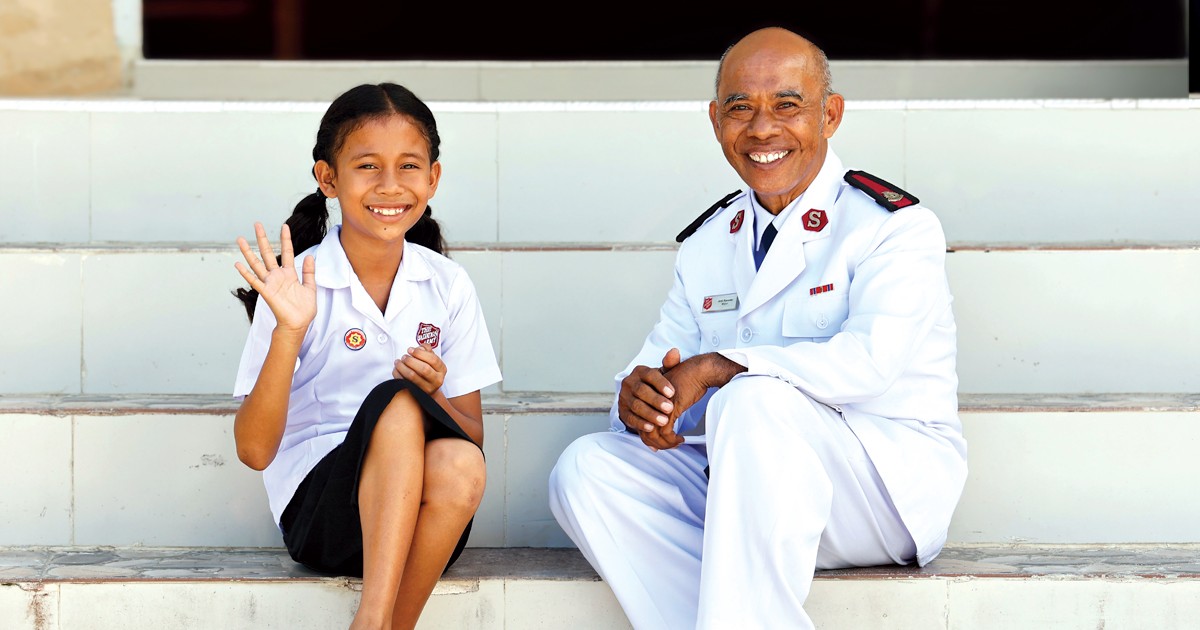(Above) Lt-Col Junior Hynes shares a moment with a resident of The Salvation Army's Grace Manor in Ottawa (Photo: Joel Johnson)
Dr. James Read, director of The Salvation Army Ethics Centre in Winnipeg, and Dr. Aimee Patterson, a Christian ethics consultant at the Ethics Centre, dig deeper into one of the Canada and Bermuda Territory’s core values: dignity.
Dear Jim,
Dignity is one of our territorial core values. It is officially described along these lines: “We respect and value each other, recognizing everyone’s worth.”
Through your work at the International Social Justice Commission, you’ve engaged the subject of dignity in partnership with the United Nations. Reading the 2018 book, Human Rights and The Salvation Army, I was reminded that the first article of the Universal Declaration of Human Rights states, “All human beings are born free and equal in dignity and rights.” This article directs all other claims about human rights.
Dignity, as the book notes, can be grounded differently for those who ascribe to the declaration. Christians ground dignity in what Scripture says about human beings. The value of all human beings is based in our being created “in the image of God” (see Genesis 1:27 and Psalm 8:5)—something affirmed in the Handbook of Doctrine and echoed in a number of international positional statements. All human beings are equal in dignity because dignity is not earned or lost, but inherent. It can only be given by God.
Now that I’m doing some hard thinking about dignity as a core value, I’ve started to notice that not all of us are using the term in this way. I see phrases like, “The Salvation Army gives dignity to vulnerable people;” “Poverty puts dignity out of reach;” and, “We work to restore the dignity of the people we serve.” What do you think about this?
Aimee
Dear Aimee,
I love that line, “All human beings are born free and equal in dignity and rights.” I see it on a huge banner at the Canadian Museum for Human Rights in Winnipeg. It stops me in my tracks every time I go. I stop because it’s not a mere cliché. Not an “of course” statement. It’s asserted in the face of those who would violently deny it. So much of human history—including biblical history—has been about one nation shouting that it is superior and dehumanizing or massacring others because they are inferior. But, the Universal Declaration of Human Rights trumpets, “All are equal!”
Now, if I understand you, you want to draw attention to the fact that Salvationists not only believe in equality, but in equal dignity.
Good point. To say dignity is something all people have and have equally isn’t a mere truism, either. Those who signed the Declaration of Human Rights may accept it, but not everyone does. So, it may take real determination for Salvationists to act as if we truly believe it.
When you add that the basis for the Christian’s belief in human dignity is found in the biblical understanding of human beings as created “in the image of God,” I find myself agreeing again. But I am not sure what you are getting at after that.
Don’t we find talk in everyday language about people who are “dignitaries” (not everyone is) and about those who “don’t look very dignified”? The online Cambridge Dictionary gives the example (similar to comments we read in newsfeeds all the time now), “In hospital, she felt stripped of all her dignity.” What’s wrong with The Salvation Army saying it gives dignity to vulnerable people? Help me understand.
Jim
Dear Jim,
In a culture that measures dignity according to personal independence and autonomy, there is a growing need for vulnerable people to hear that their dignity does not depend on their quality of life.
It is now commonly said that medical assistance in dying—the last thing we have control over—can bring a “dignified death.” Certainly, the alleviation of pain and suffering that comes with holistic health care is called for. But given that death is the final enemy and only God can overcome it, I’m not so sure death should be “dignified.”
If The Salvation Army has one thing to say about human beings, it is that even the poorest, dirtiest, smelliest, sickest person has dignity. This dignity is not something that can be elevated by social rank or diminished by a hospital gown. Dignity is what calls us to recognize, affirm and honour people by treating them as Jesus would treat them.
Those of us who engage in ministry among marginalized people are proud of what we do, and rightly so. It is good work. But we need to know that marginalized people would have dignity even if The Salvation Army was not there to serve them. So we can’t “give” it to them. We shouldn’t think we can.
Aimee










Comment
On Tuesday, July 28, 2020, Joanne Biggs said:
Leave a Comment